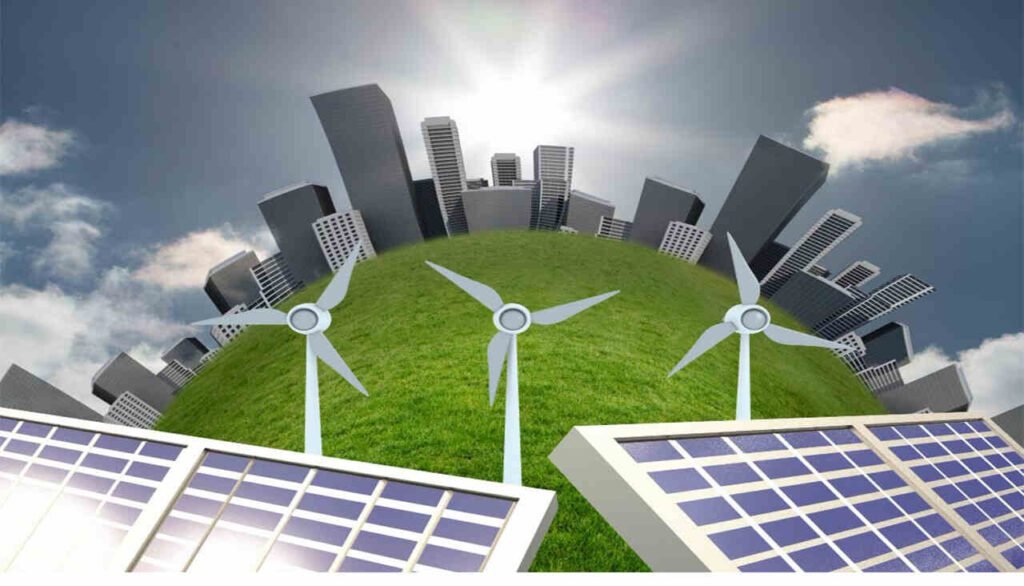Introduction
Renewable energy has emerged as a crucial solution to address the challenges posed by climate change and the growing demand for energy. With the rapid advancements in technology and increasing global awareness, renewable energy sources are gaining significant traction and becoming an integral part of the energy mix. This article delves into the various aspects of renewable energy, highlighting its benefits, current advancements, and the potential it holds for a sustainable future.
Understanding Renewable Energy
What is Renewable Energy?
Renewable energy refers to energy derived from sources that are naturally replenished and virtually inexhaustible. Unlike fossil fuels, which are finite and contribute to environmental degradation, renewable energy harnesses natural resources such as sunlight, wind, water, geothermal heat, and biomass. These sources of energy offer a clean and sustainable alternative to conventional power generation methods.
The Benefits of Renewable Energy

Environmental Sustainability:
One of the primary advantages of renewable energy is its minimal impact on the environment. By reducing greenhouse gas emissions, renewable energy helps combat climate change and mitigate the adverse effects of global warming.
Energy Security:
Relying on renewable energy sources reduces dependence on fossil fuels, which are subject to price volatility and geopolitical tensions. By diversifying the energy mix, countries can enhance their energy security and reduce the risks associated with energy supply disruptions.
Job Creation:
The transition to renewable energy opens up numerous employment opportunities. The renewable energy sector requires skilled workers for manufacturing, installation, operation, and maintenance of renewable energy systems, contributing to job growth and economic development.
Improved Public Health:
Unlike traditional energy sources, renewable energy does not release harmful pollutants into the atmosphere. By minimizing air and water pollution, renewable energy helps improve public health and reduces the prevalence of respiratory and cardiovascular diseases.
Advancements in Renewable Energy Technologies

Solar Power
Solar power has witnessed significant advancements in recent years. The efficiency of solar panels has improved, making them more cost-effective and accessible. Additionally, innovative technologies such as concentrated solar power and solar tracking systems have enhanced energy capture and utilization. The integration of solar power with energy storage systems has further increased its reliability and allowed for a consistent power supply.
Wind Power
Wind power is another rapidly growing renewable energy source. Technological advancements have led to the development of larger and more efficient wind turbines, capable of generating substantial amounts of electricity. Offshore wind farms have gained prominence, harnessing stronger and more consistent winds at sea. Improved wind forecasting techniques have also enhanced the integration of wind power into the electricity grid.
Hydropower
Hydropower, a well-established renewable energy source, continues to evolve with new developments. Run-of-river and pumped storage hydropower systems have gained popularity, providing flexible energy generation and storage capabilities. Additionally, advancements in turbine technology and fish-friendly designs have reduced environmental impacts and improved the efficiency of hydropower installations.
Geothermal Energy
Geothermal energy harnesses heat from the Earth’s core to generate electricity and provide heating and cooling solutions. Advancements in drilling techniques and geothermal plant designs have made it more feasible to extract heat from deeper underground, expanding the potential for geothermal energy production. The integration of geothermal energy with district heating systems has further enhanced its efficiency and utilization.
Bioenergy
Bioenergy utilizes organic matter, such as agricultural waste and forest residues, to produce heat, electricity, and biofuels. Technological advancements have led to more efficient conversion processes, enabling the utilization of a wider range of biomass feedstocks. Additionally, the production of advanced biofuels from non-food crops and algae shows promising potential for reducing greenhouse gas emissions in the transportation sector.
The Future of Renewable Energy

The advancements in renewable energy technologies are paving the way for a sustainable and decarbonized future. As research and development continue, the following areas hold immense promise:
Energy Storage
The development of cost-effective and efficient energy storage solutions is crucial for the widespread adoption of renewable energy. Advances in battery technologies, such as lithium-ion and solid-state batteries, are enabling large-scale energy storage, ensuring a steady and reliable power supply even during periods of low generation.
Grid Integration

Integrating renewable energy into existing power grids is a complex task. However, advancements in smart grid technologies, demand response systems, and grid management software are facilitating the seamless integration of renewable energy sources. This allows for efficient utilization of renewable energy and an optimal balance between supply and demand.
Electrification of Transportation
The transition from fossil fuel-powered vehicles to electric vehicles (EVs) is gaining momentum. EV technology continues to evolve, with advancements in battery capacity, charging infrastructure, and vehicle-to-grid systems. The electrification of transportation not only reduces carbon emissions but also creates opportunities for decentralized energy systems and vehicle-grid integration.
Conclusion
Renewable energy has made remarkable progress in recent years, revolutionizing the global energy landscape. With ongoing advancements in solar, wind, hydropower, geothermal, and bioenergy technologies, renewable energy is poised to play a pivotal role in achieving a sustainable and low-carbon future. Embracing renewable energy not only offers environmental benefits but also drives economic growth, enhances energy security, and improves public health. As we move forward, it is imperative to continue investing in research, innovation, and supportive policies to unlock the full potential of renewable energy and create a brighter future for generations to come.
Read more: truereviewmagazine.com










